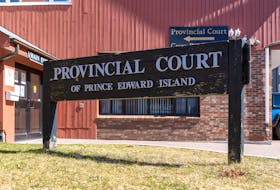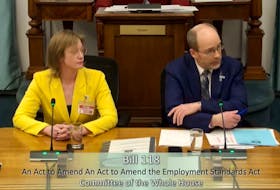Prince Edward Island had a dream to become Canada’s Internet gambling regulator — a dream that would have created tens of millions of dollars in new revenues for the country’s smallest province.
And this was just the first step in a plan to turn P.E.I. into a sort of Cayman Islands of North America.
Using technology proposed to support online gaming, the province was also exploring a proposal to position itself as a financial services hub for international IT and banking companies to bring their back-office operations to the province.
The gaming side alone was estimated to be worth upwards of $85 million a year in tax and licensing revenues for the P.E.I. government.
The second phase could have seen a number of big, multinational companies set up shop in P.E.I., bringing hundreds of jobs to the Island.
These plans almost became reality in 2012.
But after months of wining and dining millionaire company officials and holding secret meetings to keep it all from leaking out before it was signed and sealed, the venture fell apart.
Why and how and who was involved has become the source of a growing intensity of whispers and innuendo in political, legal and business circles across Prince Edward Island. Names of well-connected Liberals have been mentioned in connection with the issue. There is talk of an impending lawsuit that could see some of these people, including the minister of finance, called to testify.
The facts, however, tell the story of a province that reached further than it ever has, to reimagine its potential and position itself as a global hub for financial, banking and gaming revenues.
It was a big dream that eventually evaporated.
How it started
It all began in 2008, when the Mi’kmaq Chiefs of P.E.I. approached the newly elected Liberal government with the idea of becoming an online gaming regulator.
The Mi’kmaq Confederacy wanted a share of millions in gaming revenues other First Nations in Canada have accessed, but needed government help.
In 2009, the confederacy followed up with a letter, saying it had engaged a U.S. consultant whose research found Internet gaming as a “very lucrative venture potentially generating significant revenue that can be channeled toward necessary programming.”
P.E.I. Finance Minister Wes Sheridan liked the idea and a working group was formed. It included Sheridan, McInnes Cooper lawyers Gary Scales, Kevin Kiley, Mike O’Brien and Don MacKenzie of the Mi’kmaq Confederacy. This group met regularly at the McInnes Cooper offices in Charlottetown to discuss the gaming idea.
They were excited about the prospect of policing and taxing this largely rogue industry. Internet gambling has been increasing in popularity, siphoning lucrative gaming revenues from provincial coffers across Canada and operating without the strict rules and responsible gaming protocols imposed on traditional gaming companies.
The idea expands
As the gaming committee continued exploring this idea, in 2010, some local businessmen got wind of a U.K.-based company called Simplex that was looking to establish a near-shore presence in North America.
Simplex was building its reputation on the world financial stage, with clients such as HSDC, the Royal Bank of Scotland and some big online gaming firms. Simplex’s signature “Global Transaction Platform” offered the technological infrastructure and network for high volumes of secure financial transactions. It wanted to expand operations into North America.
The Guardian has obtained a large volume of emails exchanged between 2010 and 2012 between Simplex executives, provincial officials and others involved in this project. The emails show that a group of local businessmen encouraged Simplex to make P.E.I. their North American home. They told company executives about P.E.I.’s numerous corporate tax incentives and employee rebates, even suggesting possible government investment.
Simplex entered into preliminary talks with provincial officials, explaining its vision for a larger-scale concept for P.E.I. — one that would start with E-gaming, then expand to offer multiple back-end financial services to tech and banking companies. Using Simplex technology and P.E.I.’s legislative authority and low corporate taxes, P.E.I. could become a financial services centre, creating jobs and economic development for the province.
Wining and dining
The province liked the big picture idea, but was mainly focused on the E-gaming potential.
That’s when a few non-government locals began looking for potential clients who might be interested in setting up their tech shops and data centres in P.E.I.
Emails obtained by The Guardian detail some of the planning that went into one particular weekend event aimed at pitching P.E.I. as an E-gaming and financial services hub. One of these emails was included in a private investigator’s report, tabled recently in the P.E.I. legislature.
The P.E.I. officials wanted to show these companies all the province could offer — and ensured everyone left happy.
A hospitality suite, surf and turf dinner, golf rounds and drinks with P.E.I. officials, including the premier’s then chief-of-staff, were part of the weekend of events, according to the emails.
Plans drafted
On June 3, 2011, Simplex made things official. Company CEO Philip Walsh delivered a feasibility and design proposal to Charlottetown law firm McInnes Cooper, offering to come up with a draft plan on how to make E-gaming regulation and the financial transaction platform a reality on Prince Edward Island.
A consultancy agreement was signed between Simplex and McInnes Cooper. The terms — $60,000 for 37 days to put together a full report. An invoice obtained by The Guardian shows Simplex invoiced McInnes Cooper for this work. Sheridan says McInnes Cooper was the “official agent” for the Mi’kmaq Confederacy in the P.E.I. gaming initiative.
$85-million prospect
Simplex completed its report in August 2011. It was a roadmap for turning P.E.I. into Canada’s Internet gaming regulator with further capability of offering banks and IT firms the ability to route their financial transactions through P.E.I.
Prince Edward Island could make upwards of $85 million per year in tax and licensing revenues from Canadian gamers alone, Simplex estimated in this report.
A subsequent phase was also suggested to try to cash in on a portion of the international E-gaming market.
The report includes a detailed draft rollout plan, including a timeline that aimed to go live with a few early adopter gaming companies, such as Pokerstars, as early as March 2012.
Criminal Code concerns
There was a problem. Not everyone was sure this plan was entirely legal.
Simplex knew this, and discussed it at length in its report.
“Canada has clear prohibitions against Internet gaming,” it stated, but then details how the Kahnawake First Nation in Quebec asserted itself as a sovereign nation and has been operating as a gaming regulator for years “with virtual impunity from federal and provincial authorities.”
It also points out Canadian provinces are authorized to regulate and sanction gambling in their respective jurisdictions. Simplex made the case that governments need to “embrace Internet gambling under government control” to stop losing gaming revenues to unregulated offshore gambling companies.
“It may be a business that gives the politicians butterflies, but its pure economic importance may cause them to take a Gravol and press ahead,” Simplex states.
E-gaming: Confidential
Work on the gaming initiative was put on ice for a few months after this, as the proposal was highly confidential and the province was in the midst of a provincial election.
Sheridan acknowledges the gaming proposal and the committee’s very existence were kept deeply under wraps, but says was this was necessary for competitive reasons.
Other provinces, and a few American states, were also pursuing Internet gambling regulation.
“We had to maintain that confidentiality or we’d lose that first shot at (becoming) first mover.”
This committee’s activities were funded by a provincial government loan issued to the Mi’kmaq Confederacy.
Government won’t reveal any amounts loaned to the confederacy for gaming activities, saying only it was less than $1 million.
This amount included a trip Sheridan and the committee took to London in 2011 for a gaming conference (which has previously been erroneously reported to have happened in 2012). It also includes work done by experts hired to explore regulatory and legislative particulars.
E-gaming dies
The online gaming proposal for P.E.I. was axed in February 2012 on the fifth floor of the Shaw building.
A meeting was called that included the gaming committee, Sheridan and the Mi’kmaq chiefs in the Innovation department boardroom. It has been alleged the premier was part of this meeting, but provincial officials say he was not in attendance.
“Legal and technical challenges” were identified with the E-gaming plan and it was decisively scrapped.
Sheridan continues to believe Internet gambling companies need to be policed and taxed and was disappointed P.E.I.’s proposal to be the country’s regulator did not go forward. The file has been forwarded to the country’s lottery corporations to explore.
The E-gaming file died, but the province was still interested in the financial services side of Simplex’s proposal. Negotiations on this file continued through the Innovation Department, but those negotiations ended with a complaint filed to P.E.I. securities commissioner. Read tomorrow’s edition of The Guardian for Part 2 of this story.
Prince Edward Island had a dream to become Canada’s Internet gambling regulator — a dream that would have created tens of millions of dollars in new revenues for the country’s smallest province.
And this was just the first step in a plan to turn P.E.I. into a sort of Cayman Islands of North America.
Using technology proposed to support online gaming, the province was also exploring a proposal to position itself as a financial services hub for international IT and banking companies to bring their back-office operations to the province.
The gaming side alone was estimated to be worth upwards of $85 million a year in tax and licensing revenues for the P.E.I. government.
The second phase could have seen a number of big, multinational companies set up shop in P.E.I., bringing hundreds of jobs to the Island.
These plans almost became reality in 2012.
But after months of wining and dining millionaire company officials and holding secret meetings to keep it all from leaking out before it was signed and sealed, the venture fell apart.
Why and how and who was involved has become the source of a growing intensity of whispers and innuendo in political, legal and business circles across Prince Edward Island. Names of well-connected Liberals have been mentioned in connection with the issue. There is talk of an impending lawsuit that could see some of these people, including the minister of finance, called to testify.
The facts, however, tell the story of a province that reached further than it ever has, to reimagine its potential and position itself as a global hub for financial, banking and gaming revenues.
It was a big dream that eventually evaporated.
How it started
It all began in 2008, when the Mi’kmaq Chiefs of P.E.I. approached the newly elected Liberal government with the idea of becoming an online gaming regulator.
The Mi’kmaq Confederacy wanted a share of millions in gaming revenues other First Nations in Canada have accessed, but needed government help.
In 2009, the confederacy followed up with a letter, saying it had engaged a U.S. consultant whose research found Internet gaming as a “very lucrative venture potentially generating significant revenue that can be channeled toward necessary programming.”
P.E.I. Finance Minister Wes Sheridan liked the idea and a working group was formed. It included Sheridan, McInnes Cooper lawyers Gary Scales, Kevin Kiley, Mike O’Brien and Don MacKenzie of the Mi’kmaq Confederacy. This group met regularly at the McInnes Cooper offices in Charlottetown to discuss the gaming idea.
They were excited about the prospect of policing and taxing this largely rogue industry. Internet gambling has been increasing in popularity, siphoning lucrative gaming revenues from provincial coffers across Canada and operating without the strict rules and responsible gaming protocols imposed on traditional gaming companies.
The idea expands
As the gaming committee continued exploring this idea, in 2010, some local businessmen got wind of a U.K.-based company called Simplex that was looking to establish a near-shore presence in North America.
Simplex was building its reputation on the world financial stage, with clients such as HSDC, the Royal Bank of Scotland and some big online gaming firms. Simplex’s signature “Global Transaction Platform” offered the technological infrastructure and network for high volumes of secure financial transactions. It wanted to expand operations into North America.
The Guardian has obtained a large volume of emails exchanged between 2010 and 2012 between Simplex executives, provincial officials and others involved in this project. The emails show that a group of local businessmen encouraged Simplex to make P.E.I. their North American home. They told company executives about P.E.I.’s numerous corporate tax incentives and employee rebates, even suggesting possible government investment.
Simplex entered into preliminary talks with provincial officials, explaining its vision for a larger-scale concept for P.E.I. — one that would start with E-gaming, then expand to offer multiple back-end financial services to tech and banking companies. Using Simplex technology and P.E.I.’s legislative authority and low corporate taxes, P.E.I. could become a financial services centre, creating jobs and economic development for the province.
Wining and dining
The province liked the big picture idea, but was mainly focused on the E-gaming potential.
That’s when a few non-government locals began looking for potential clients who might be interested in setting up their tech shops and data centres in P.E.I.
Emails obtained by The Guardian detail some of the planning that went into one particular weekend event aimed at pitching P.E.I. as an E-gaming and financial services hub. One of these emails was included in a private investigator’s report, tabled recently in the P.E.I. legislature.
The P.E.I. officials wanted to show these companies all the province could offer — and ensured everyone left happy.
A hospitality suite, surf and turf dinner, golf rounds and drinks with P.E.I. officials, including the premier’s then chief-of-staff, were part of the weekend of events, according to the emails.
Plans drafted
On June 3, 2011, Simplex made things official. Company CEO Philip Walsh delivered a feasibility and design proposal to Charlottetown law firm McInnes Cooper, offering to come up with a draft plan on how to make E-gaming regulation and the financial transaction platform a reality on Prince Edward Island.
A consultancy agreement was signed between Simplex and McInnes Cooper. The terms — $60,000 for 37 days to put together a full report. An invoice obtained by The Guardian shows Simplex invoiced McInnes Cooper for this work. Sheridan says McInnes Cooper was the “official agent” for the Mi’kmaq Confederacy in the P.E.I. gaming initiative.
$85-million prospect
Simplex completed its report in August 2011. It was a roadmap for turning P.E.I. into Canada’s Internet gaming regulator with further capability of offering banks and IT firms the ability to route their financial transactions through P.E.I.
Prince Edward Island could make upwards of $85 million per year in tax and licensing revenues from Canadian gamers alone, Simplex estimated in this report.
A subsequent phase was also suggested to try to cash in on a portion of the international E-gaming market.
The report includes a detailed draft rollout plan, including a timeline that aimed to go live with a few early adopter gaming companies, such as Pokerstars, as early as March 2012.
Criminal Code concerns
There was a problem. Not everyone was sure this plan was entirely legal.
Simplex knew this, and discussed it at length in its report.
“Canada has clear prohibitions against Internet gaming,” it stated, but then details how the Kahnawake First Nation in Quebec asserted itself as a sovereign nation and has been operating as a gaming regulator for years “with virtual impunity from federal and provincial authorities.”
It also points out Canadian provinces are authorized to regulate and sanction gambling in their respective jurisdictions. Simplex made the case that governments need to “embrace Internet gambling under government control” to stop losing gaming revenues to unregulated offshore gambling companies.
“It may be a business that gives the politicians butterflies, but its pure economic importance may cause them to take a Gravol and press ahead,” Simplex states.
E-gaming: Confidential
Work on the gaming initiative was put on ice for a few months after this, as the proposal was highly confidential and the province was in the midst of a provincial election.
Sheridan acknowledges the gaming proposal and the committee’s very existence were kept deeply under wraps, but says was this was necessary for competitive reasons.
Other provinces, and a few American states, were also pursuing Internet gambling regulation.
“We had to maintain that confidentiality or we’d lose that first shot at (becoming) first mover.”
This committee’s activities were funded by a provincial government loan issued to the Mi’kmaq Confederacy.
Government won’t reveal any amounts loaned to the confederacy for gaming activities, saying only it was less than $1 million.
This amount included a trip Sheridan and the committee took to London in 2011 for a gaming conference (which has previously been erroneously reported to have happened in 2012). It also includes work done by experts hired to explore regulatory and legislative particulars.
E-gaming dies
The online gaming proposal for P.E.I. was axed in February 2012 on the fifth floor of the Shaw building.
A meeting was called that included the gaming committee, Sheridan and the Mi’kmaq chiefs in the Innovation department boardroom. It has been alleged the premier was part of this meeting, but provincial officials say he was not in attendance.
“Legal and technical challenges” were identified with the E-gaming plan and it was decisively scrapped.
Sheridan continues to believe Internet gambling companies need to be policed and taxed and was disappointed P.E.I.’s proposal to be the country’s regulator did not go forward. The file has been forwarded to the country’s lottery corporations to explore.
The E-gaming file died, but the province was still interested in the financial services side of Simplex’s proposal. Negotiations on this file continued through the Innovation Department, but those negotiations ended with a complaint filed to P.E.I. securities commissioner. Read tomorrow’s edition of The Guardian for Part 2 of this story.









